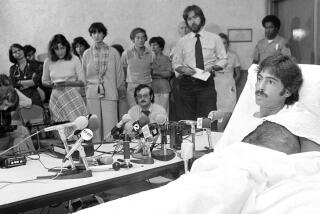Missionary Held in Mozambique Recounts Terror
- Share via
The Rev. Kenneth Daugherty spent six nights and seven days last month as the prisoner of soldiers in Mozambique.
He slept on a bare floor in a cockroach-infested house.
He was herded at gunpoint into an armored truck and driven to an open field, where, he said, “I knew I would die. . . . They really meant to kill me.”
He was kept in solitary confinement in a cell the size of a closet. During the night, he dreamed he would be there forever.
So, during an interview last week in Carlsbad, his first complaint was a surprising one.
“I’ve been commuting from Chula Vista to Carlsbad for more than a year, and boy is it rough,” he said with a sigh.
Suddenly, the tall, soft-spoken Daugherty, who bears more than a slight resemblance to Jimmy Stewart, seemed to realize that such a lament sounded strange coming from him.
He winced.
“Of course,” he said with a smile, “being locked in a cell is a lot worse.”
Daugherty, who for 23 years has been a Southern Baptist minister in Chula Vista and Hawaii, was one of six medical relief workers captured in Mozambique on Oct. 24. They and their two guides were held until Oct. 30; on several occasions, they were threatened with death, he said. Guns were pointed at them. They were told, “Make one move, and we’ll blow you away.” And repeatedly, he said, outside the cells where they slept, guards cocked their guns as a method of “sadistic torture.”
For a year and four months, Daugherty, 52, has been an employee of the Carlsbad-based Christian Emergency Relief Team, which offers medical aid and supplies to war-torn countries, particularly those in conflict with communist neighbors. CERT, by its own admission, swings to the right politically, whether it’s aid to Nicaraguan Contras or any enemy of the Soviet Union.
Daugherty and his colleagues held captive in Marxist Mozambique have, for the month of November, been the objects of an outpouring of sympathy and affection. But questions remain: What were a minister, two guides (one with a controversial record) and five volunteers, unaccustomed to such high adventure, doing in a part of the world where war rages and tensions have never been worse?
And why, exactly, were they captured?
Daugherty said the group strayed into Mozambique (which is in conflict with neighboring Malawi and South Africa) and arrived at a military checkpoint, realizing they had gone too far and that a hellish ordeal had already begun.
“We came to a fork in the road and, instead of turning left, as we should have, we went straight,” he said. “It wasn’t the fault of anyone. There were no signs to indicate we had left Malawi, where our mission was centered, and entered Mozambique, where we didn’t want to be. We made a mistake.”
Daugherty and crew spent 19 hours at the checkpoint, 12 of which found all eight of them trying to sleep in a cramped rented car. The car remains in Mozambique; Daugherty worries that he will be the one to pay for it, and, because of its value in a land where cars are scarce, it may cost him $50,000.
The next morning, Oct. 25, he and the crew were driven at gunpoint to the open field, where they believed they would be the victims of a mass execution. As it turned out, nothing happened. In what turned out to be “the first of many miracles,” Daugherty said, it was a stop, nothing more.
He isn’t sure about the motive for the capture. He believes it was the doing of “an overzealous commander, who probably had his britches busted” by the president of Mozambique, who investigated and then intervened, he said, on behalf of the American Embassy.
Daugherty said that he does not regret the mission, and that CERT will not “back off” from similar trips. The organization has gone to Central America and Afghanistan and, he said, has yet to suffer death or injury. If anything, he said, the trip to Malawi “has strengthened our resolve.”
CERT went there to set up medical and dental operations. Part of the mission involved skin grafts and dental reconstruction in villages where the practice of medicine is at best primitive.
Daugherty believes in everything CERT holds dear. He pointed to the anguished face of a girl in a photograph taken in Soviet-occupied Afghanistan and said: “As a Christian organization, we’ve been accused of being political, but I see it in a different way. We’re opposed to communism for its anti-God philosophy. In that sense, it is a religion, but one utterly without God.”
Gary Becks, a Vietnam veteran who last year left CERT in a bitter disagreement with founder David Courson, said he opposes its focus on “short-term rather than long-term missions.” Becks has since formed a similar organization, but says his is “more militant.” Unlike CERT, he advocates arming itself on missions to hostile regions and takes a militaristic posture toward the practice of “medical relief.”
He is critical of CERT’s mission to Africa, saying there was no reason to put volunteers at the mercy of fate.
“I have problems with them going into these areas and taking volunteers,” said Becks, now working in the Washington office of Rep. Duncan Hunter (R-Coronado). “Volunteers don’t realize the hazards involved. There’s an implied safety with a leader taking volunteers into the teeth of such regions. It’s a ‘safety’ the volunteers don’t understand, or choose not to examine.”
Besides Daugherty, CERT’s crew in Malawi included surgeon Fred Leist, 48, and his wife, Lucille, 43, a nurse from Seattle; John Cannon, 69, a dentist from Davenport, Iowa; Steven Sherrill, 48, a paramedic from Stroudsburg, Pa., and Carol Roberts, 26, a paramedic from Syracuse, N.Y.
Its guides were South African George Bezedenhout and Peter Hammond, a British citizen living in South Africa. Hammond has been accused by AIM, the official Mozambique news agency, of running “a far-right, quasi-religious outfit called Frontline Fellowship, which is openly supportive of South African-backed bandit organizations such as UNITA in Angola and the MNR in Mozambique.”
The Associated Press reported that Hammond’s name surfaced in the 1988 trial of an Australian missionary who confessed to working illegally for the Mozambique National Resistance guerrillas and entering the country illegally.
Ian Grey, the Australian missionary released in August after serving 17 months of a 10 1/2-year prison sentence, told a news conference immediately after his trial that right-wing American preachers were flown into guerrilla-controlled parts of Mozambique, via Malawi, after contacts with Hammond.
Was CERT aware of Hammond’s reputation before the mission, and was the crew captured because of him?
“I don’t think so,” Daugherty said. “I do believe his being with us saved his skin, though. I was not aware of those things; I’ve heard a lot since I got back. Maybe we should have asked more questions. I don’t think Peter was trying to conceal anything, and I don’t know that those accusations are true. I rather doubt that they are.”
Dr. William Taylor, a plastic surgeon in Mission Valley, volunteered for a CERT mission to Afghanistan in May of last year. He described CERT as “60% evangelical, 40% medical aid,” figures with which CERT doesn’t quibble. He was asked whether its leaders exercise caution.
“Hard for me to measure,” Taylor said. “I have no experience in combat areas. I didn’t think we were in that much danger, and then at one point we scattered and ran because Soviet helicopters were hovering overhead. During some of the prayers, the group kept shouting, ‘Free Afghanistan!’ ”
Taylor said he lost $50,000 in going to Afghanistan and working free, but, “Damn,” he said, “it was worth it. These were all kids, ages 3 to 18, with cleft lips. They would never have had them fixed had I not been there.”
After returning from Africa, Daugherty said he had spoken with the five volunteers, none of whom regretted the mission.
“We always make clear to our volunteers to know exactly what they’re getting into,” he said. “We take every risk and every precaution, and, in 15 years, we have had no injuries and no deaths, not even a snake bite. We have an impeccable track record.”
Even so, the trip was a nightmare.
“And my dreams have been worse since I returned,” Daugherty said.
The worst, by far, was, of course, that moment in the field. What did he think about with death so close?
“Only of my family,” he said. “My children are young, 5 and 3--I’m an old dad. I thought, ‘They’ll grow up without ever knowing their father.’ My wife’s dad died when she was 2, so I thought, ‘It’s happening to her all over again, and to our children, too.’
“But inwardly, I felt a peace, which I believe God gave to me. I was not afraid to die. I grieved only for my wife and children, back home in San Diego.”
More to Read
Sign up for Essential California
The most important California stories and recommendations in your inbox every morning.
You may occasionally receive promotional content from the Los Angeles Times.













